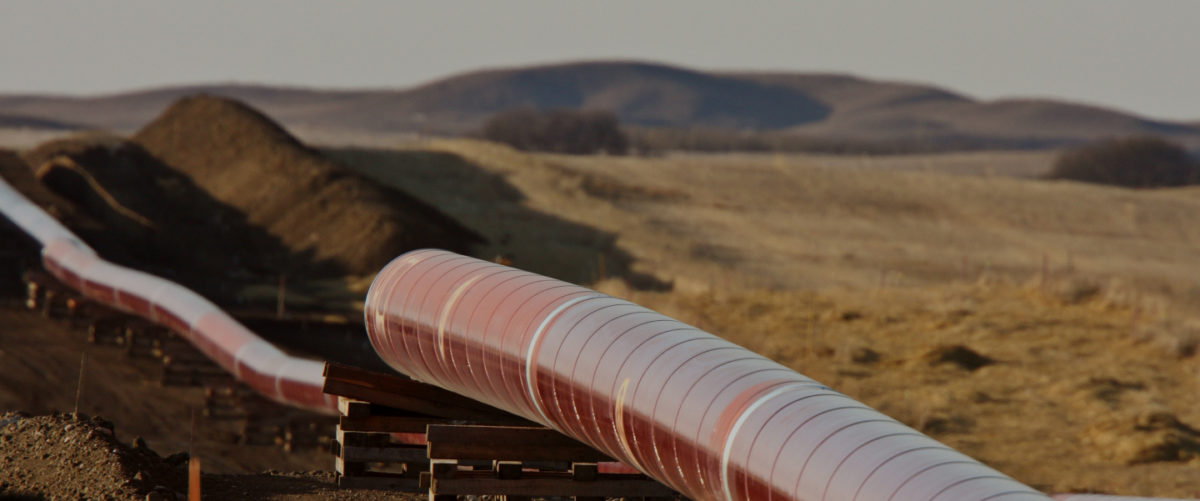A Federal Energy Agency Could Make A Change That Thwarts Climate Offenders
Published Apr 19, 2022

The Federal Energy Regulatory Commission has proposed changes to how it approves gas projects like pipelines. It could be a turning point for climate impact consideration.
For the first time in over two decades, the Federal Energy Regulatory Commission (FERC) issued two new proposed permitting policies. The policies will inform how FERC considers whether an interstate gas infrastructure project is in the public interest before permitting. The first policy revises its gas certification policy, which has been unchanged since 1998. The second proposes an interim policy concerning how FERC will analyze the climate impacts of proposed infrastructure projects. For years, Food & Water Watch has been pushing FERC to improve its certification policy through litigation and legal comments. It appears FERC may be poised to finally consider the true climate and community impacts of fossil fuel gas projects.
These policies indicate that FERC and its new Commissioners may begin taking their duties under the Natural Gas Act and the National Environmental Policy Act (NEPA) more seriously. So does FERC’s Strategic Plan for 2022-2026. The Natural Gas Act requires projects to be in the public interest. NEPA requires agencies to evaluate the environmental impacts of proposed federal actions like pipeline approvals. But it stands to be seen how these policies will be applied in practice. Under pressure from fossil fuel interests, will FERC commissioners stand strong against permits for gas projects that will cause environmental harm?
FERC Has A History Of Rubber-Stamping New Gas Projects
During the fracking boom of the early 21st century, FERC’s flexibility was a convenience for the gas pipeline industry’s vast expansion plans. In that time, FERC granted 1,021 approvals over twenty years and rejected only six. Simultaneously, FERC glossed over the harmful effects of gas infrastructure, including greenhouse gas emissions, downwind air pollution, and threats to public safety. It also completely ignored the big picture. Pipelines need expanded fracking operations to feed them, meaning more fossil fuel extraction over the decades-long lifetime of the infrastructure. However, there has also been consistent pressure from the public, court decisions, and a change in administration. Because of that, FERC has finally re-evaluated how it will determine if a project is in the public interest.
FERC’s New Certification and Greenhouse Gas Policies
In issuing its new gas certification policy, FERC strengthens its review of new and modified gas infrastructure in several ways. These include:
- Requiring more information from project applicants on foreseeable but indirect impacts (e.g., fracking) and greenhouse gas (GHG) emissions from the eventual burning of the piped gas;
- Greater evidence of “need” for the pipeline that cannot otherwise be addressed,
- And collection of information on the cumulative harms to nearby communities.
FERC has also for the first time proposed a separate policy on the consideration of GHGs. The draft features an emissions threshold that would categorize most new or modified gas infrastructure as having “significant” climate impact. This is an important change because a significance finding means FERC must do a more rigorous environmental review under NEPA. However, this policy is still just a proposal and the Commission is seeking input from the public until April 25th.
Pressure From Watchdog Groups And Communities Is Crucial For Enforcement
Food & Water Watch’s work in the courts is keeping pressure on FERC to adopt strong policies. In March, the federal D.C. Circuit Court of Appeals in Food & Water Watch v. FERC issued an important decision. It held that the Commission could no longer ignore the emissions from gas delivered to local distribution companies. The court found FERC must review the indirect, but foreseeable, greenhouse gas emissions from even a single compressor station replacement.
This is only the beginning, however, as a policy is only as strong as it is enacted and enforced. At a time when fossil fuel interests are pushing to build infrastructure to export fracked gas around the world, FERC Chairman Glick, recently stated:
“FERC has never rejected an LNG project based on climate change [concerns]…”
He went on to say that he doesn’t “think there’s a linkage between climate change and limitations on exports.” Food & Water Watch will continue to pressure FERC to take into account the full climate impacts of fossil fuel projects. We’ll hold the agency accountable if it continues rubber-stamping gas infrastructure development.
You Can Do Something Easy Right Now To Make This Change Official
FERC Commissioners are under tremendous pressure from the gas industry and the politicians funded by them. That’s why it’s so important FERC commissioners hear from you!
Tell FERC that climate change is a reasonably foreseeable impact of gas infrastructure approval, and that it must consider fracking’s impacts when approving pipelines. Most importantly, tell the commissioners that FERC must deny new gas infrastructure applications as contrary to the public interest. The comment period on FERC’s draft gas certification and GHG policies is open until April 25th – weigh in now!
Urge FERC to finalize these new policies.* It just takes a moment!
*Please reference Docket Nos. PL18-1-000 and PL21-3-000 in your comment to FERC.
Enjoyed this article?
Sign up for updates.
TO TOP


